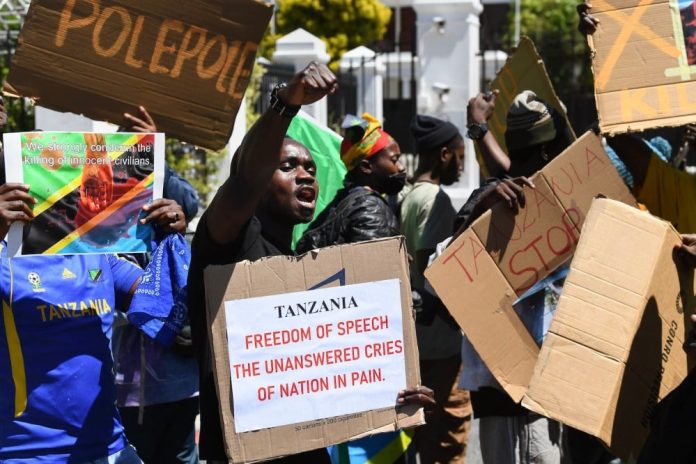“We don’t do that here,” was a common refrain at every Tanzanian election in recent decades. International media outlets would descend for another flawed election in another unstable African democracy, and they would file reports dripping with condescension that included variations of the question: “Is it likely to turn violent?”
Tanzanians were justifiably proud of their record of peace and stability. Few would have described their democracy as perfect, but among the norms developed in more than 60 years of independence and 30 years of multiparty democracy was respect for term limits and the peaceful transfer of power—albeit only ever from one president representing the ruling Chama Cha Mapinduzi (CCM) party to another. Similarly, mass protests were vanishingly rare.
“We don’t do that here,” was a common refrain at every Tanzanian election in recent decades. International media outlets would descend for another flawed election in another unstable African democracy, and they would file reports dripping with condescension that included variations of the question: “Is it likely to turn violent?”
Tanzanians were justifiably proud of their record of peace and stability. Few would have described their democracy as perfect, but among the norms developed in more than 60 years of independence and 30 years of multiparty democracy was respect for term limits and the peaceful transfer of power—albeit only ever from one president representing the ruling Chama Cha Mapinduzi (CCM) party to another. Similarly, mass protests were vanishingly rare.
Yet this time, almost as soon as polls opened on Oct. 29, protesters decrying unfair elections began targeting polling stations, stealing ballot boxes, and burning tires and buildings. Neither a nationwide internet shutoff nor the heavy police and army presence on the streets deterred them. A nighttime curfew brought cover for the real horror: violent and uncompromising reprisals from the security forces. The death toll is far from clear, but a diplomatic source told the BBC that there was credible evidence of at least 500 people killed before the weekend, and the violence did not stop then.
In the wake of this crackdown, on Monday, President Samia Suluhu Hassan was sworn in for another term. She has called for calm but also spoken publicly of the need to protect national security at all costs, warning protesters that she would not hesitate to deploy the full power of the security forces against them. There is a heavy police and army presence on the streets, along with claims of mass burials being conducted, and a mobile phone users have received a message warning them that sharing images could lead to treason charges. Members of the public are in shock, trying to process what they have just gone through.
So, what went wrong this time? Why did this “island of stability” in a turbulent region suddenly fall into political crisis?
First, it’s important to note that Tanzania’s democracy has been crumbling for some time. Going into last week’s sham election, the country was much closer to capsizing than its steady-ship international image implied.
The election was Hassan’s attempt to secure her own mandate. She had taken the top job in 2021 as a promotion from vice president after the sudden death in office of her predecessor, John Magufuli. As the country’s first female president, who comes from the semi-autonomous Zanzibar region and lacks a strong power base of her own, Hassan has faced misogyny and distrust, including from senior CCM officials.
Some analysts have argued that this made her determined to deliver the strongest possible election result at whatever cost. That would explain why her two main opponents were both blocked from contesting the election. Others have suggested that her lack of allies has made her vulnerable to manipulation by security services that had been emboldened under Magufuli.
Early in her administration, Hassan reached out to opposition leaders and the media, apparently seeking some form of reconciliation. But as the election drew nearer, this olive branch began to look more like a fig leaf. Opposition leader Tundu Lissu was arrested in April and remains in prison on charges of treason that Human Rights Watch and the European Parliament have described as politically motivated. United Nations human rights experts in June reported a “pattern of enforced disappearance and torture to silence opposition and critics.”
To be clear, Magufuli’s rule between 2015 and 2021 was also characterized by tight restrictions on opposition parties, the media, and civil society. Police and other security forces acted with ever-increasing heavy-handed confidence and impunity. Magufuli’s own reelection in 2020 was itself highly flawed, achieved on a playing field tilted heavily in his favor.
Even before Magufuli, while Tanzania was relatively stable and peaceful, anti-democratic tendencies had long been part of the picture: newspaper bans, suspicious deaths of political opponents, tight regulation of freedom of expression and association, and more.
Now, however, demographics and economic factors have further fueled discontent. People are suffering from the rising cost of living and mass youth unemployment. Social media has played a role, along with inspiration taken from recent Gen Z-led protests in neighboring Kenya and Mozambique. Tanzania’s older generation may have invested much pride in the “we don’t do that here” perspective, but many younger citizens see it as an outdated mindset that enables repression.
Given the lack of a meaningful opposition and the widespread reports of low footfall at polling stations, the official result, with Hassan reelected with 98 percent of the vote on an unprecedently high nearly 87 percent turnout, bears little-to-no credibility. Election observers from the Southern African Development Community and African Union have both issued damning preliminary statements. The discreet, security-heavy nature of the swearing-in ceremony contrasted sharply with stadium-scale previous affairs, a tacit admission of embarrassment.
Now, the question is how Tanzania can escape a descent into further chaos. The protesters reportedly have support within some elements of the security services, and the violent crackdown on the demonstrations will have won them more sympathy, even within corridors of power. Nevertheless, that response may succeed in quashing the sporadic protests that have continued. The protesters are more a disparate band of angry young people than a well-organized movement, with little to defend themselves against heavily armed security forces. The turmoil will likely leave the country with a dangerous legacy of anger and embolden those who see force as the best response to criticism.
Perhaps calmer heads can prevail and find a compromise. Tanzania has some elder-statesmen figures who would command respect on all sides, the most obvious being former Prime Minister Joseph Warioba. He chaired previous efforts at constitutional reform (which ran out of time before the 2015 elections and were dropped by the newly elected Magufuli thereafter) and has spoken up against the politicization of the security forces and judicial system—yet he remains influential within the ruling party.
The outline of a compromise agreement is not hard to see: an interim unity government, release of key political prisoners, a new constitution with a new electoral commission and elections in, say, 12 months from now. U.N. Secretary-General António Guterres has called for a “thorough and impartial investigation” into the reports of security-force abuses, which would also be helpful, if unlikely to be acceptable to the government.
Tanzania’s reputation for peace and stability—along with its struggling democracy, economic prospects, and the lives of protesters—is on the line.
Amid the turmoil, there is an opportunity here to correct the country’s course, to act before the mistakes of the past few years become established norms for the future. There is much fear in this moment. But there is also an element of hope. “We don’t do that here” may be gone, but “we did that once, but never again” is something worth striving for.

